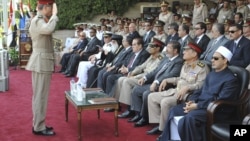CAIRO — Egypt's newly elected president Mohamed Morsi appears on a collision course with the country's powerful military generals after ordering the parliament to reconvene, in defiance of a high court decree last month that dissolved the legislature.
Last month, Egypt's generals dissolved parliament in line with an order from the country's highest court. On Sunday, President Morsi, who was sworn-in only one week ago, decreed that the legislature - which is dominated by his fellow Islamists - should reconvene until a new one has been elected.
He said elections would be held within 60 days of a new constitution being drafted and approved in a referendum, a process that analysts say could take months.
The surprise announcement sent the Supreme Council of the Armed Forces or SCAF into emergency mode, with a hastily called meeting Sunday night that resumed on Monday.
Later on Monday, the Supreme Constitutional Court declared that its ruling on dissolving the parliament was final and binding.
Hafez Abu Saada, a lawyer and head of the Egyptian Organization for Human Rights, says he believes the president could have handled this differently and has now created a politically fraught situation.
He says he believes this could have been dealt with in different ways, but that it is a clash and it could mean the emergence of a kind of cold war between the presidency, the military council and civil forces.
Fahmy Howeidi, a columnist with the independent daily ElShorouk, notes the timing of the president's decree, just days ahead of his first overseas trip and before a visit to Cairo by U.S. Secretary of State Hillary Clinton.
“I think this decision could have been delayed, but why did he decide to declare or to decide about the parliament before his departure to Saudia? Is he sending a message saying he is the real ruler, not the military? You know that Washington criticized the military for their latest statement [dissolving parliament], so was he encouraged by this criticism, in order to embarrass the military?,” Howeidi said.
Lawyer Abu Saada says President Morsi's decision to challenge a verdict of the Supreme Constitutional Court is unprecedented in modern Egypt -- something that even Hosni Mubarak, Anwar Sadat and Gamal Abdel Nasser never did.
He says the president took an oath to respect the law and the constitution and did so in front of the constitutional court, yet he is the first to violate the rulings of that court. As a result, he says, this is a message to society that you can challenge the verdicts of the judiciary and not respect them.
While no one expected an easy relationship between the army and the conservative Muslim president, most believed Morsi would move more cautiously and not provoke a confrontation with the generals so quickly.
But Fahmy Howeidi is taking a wait-and-see approach. He says private talks are still continuing on all sides and the people must wait a bit longer to see how this first act will play out.
Last month, Egypt's generals dissolved parliament in line with an order from the country's highest court. On Sunday, President Morsi, who was sworn-in only one week ago, decreed that the legislature - which is dominated by his fellow Islamists - should reconvene until a new one has been elected.
He said elections would be held within 60 days of a new constitution being drafted and approved in a referendum, a process that analysts say could take months.
The surprise announcement sent the Supreme Council of the Armed Forces or SCAF into emergency mode, with a hastily called meeting Sunday night that resumed on Monday.
Later on Monday, the Supreme Constitutional Court declared that its ruling on dissolving the parliament was final and binding.
Hafez Abu Saada, a lawyer and head of the Egyptian Organization for Human Rights, says he believes the president could have handled this differently and has now created a politically fraught situation.
He says he believes this could have been dealt with in different ways, but that it is a clash and it could mean the emergence of a kind of cold war between the presidency, the military council and civil forces.
Fahmy Howeidi, a columnist with the independent daily ElShorouk, notes the timing of the president's decree, just days ahead of his first overseas trip and before a visit to Cairo by U.S. Secretary of State Hillary Clinton.
“I think this decision could have been delayed, but why did he decide to declare or to decide about the parliament before his departure to Saudia? Is he sending a message saying he is the real ruler, not the military? You know that Washington criticized the military for their latest statement [dissolving parliament], so was he encouraged by this criticism, in order to embarrass the military?,” Howeidi said.
Lawyer Abu Saada says President Morsi's decision to challenge a verdict of the Supreme Constitutional Court is unprecedented in modern Egypt -- something that even Hosni Mubarak, Anwar Sadat and Gamal Abdel Nasser never did.
He says the president took an oath to respect the law and the constitution and did so in front of the constitutional court, yet he is the first to violate the rulings of that court. As a result, he says, this is a message to society that you can challenge the verdicts of the judiciary and not respect them.
While no one expected an easy relationship between the army and the conservative Muslim president, most believed Morsi would move more cautiously and not provoke a confrontation with the generals so quickly.
But Fahmy Howeidi is taking a wait-and-see approach. He says private talks are still continuing on all sides and the people must wait a bit longer to see how this first act will play out.




